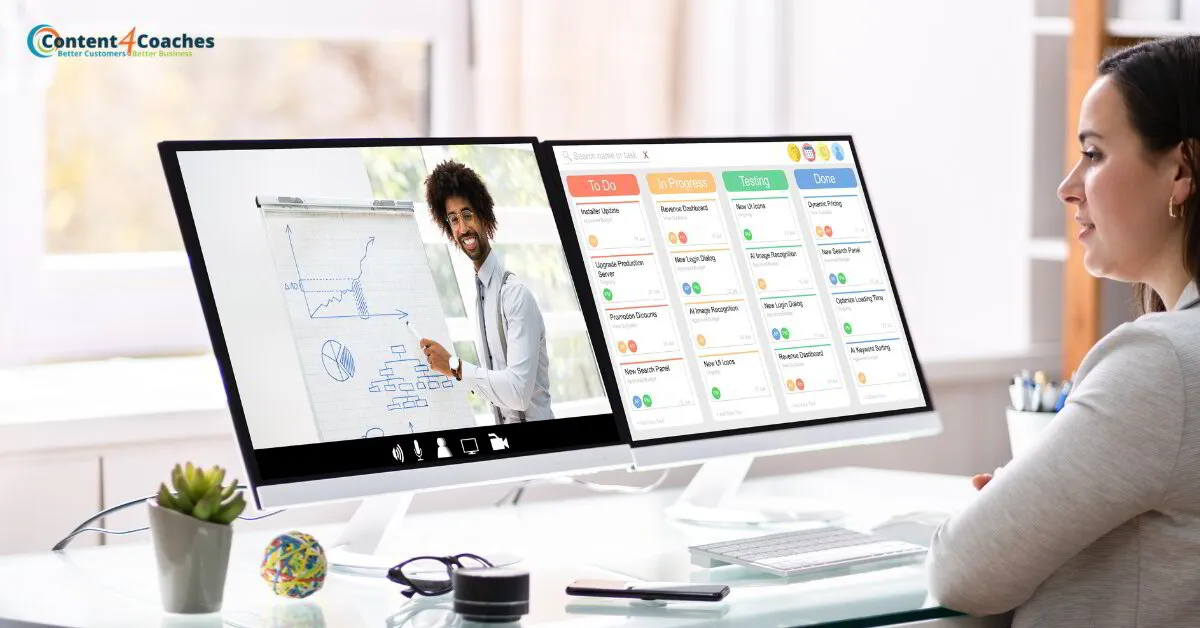Creating a successful mini-course requires a lot of thought and planning. It's important to keep in mind that your audience is looking for something that will capture their attention and keep them engaged. Therefore, it's crucial to make sure your content is interesting, relevant, and valuable to them.
One way to achieve this is by identifying a problem or challenge that your target audience is currently facing and offer an immediate solution to that problem. This approach not only makes your mini-course more appealing to your prospects, but it also adds value to their lives by providing them with a solution that they can use right away.
Also, it's essential to create quality content that will be easy to understand and follow, and that will help your students achieve their goals. This will help you build trust and credibility with your audience.
1. Consider Your Customers
In order to create an effective mini-course, you have got to know your audience well. This helps you identify the kind of help they need. If your course solves a problem, and they see it wherever you share it, it will be successful.
How well do you know your ideal customer? Do you have an ideal customer profile? Before planning your mini-course, you should take some time to review and update what you know about your target audience.
The goal here is not to just figure out age, location, profession or marital status, it's to identify what makes them think the way they do. What makes them decide they need to solve a particular problem. So many people tell you that you need to identify your ideal customer but they miss this most important part.
You have got to know the pain points that you can solve for them and they have to want to solve them badly enough that they are willing to spend money on it.
2. Pick the Problem
A great deal of the success (or failure) of your mini-course is determined by the problem you choose to solve. Spend some time identifying the top 3 challenges your ideal customers are dealing with, and then narrow your choice down to the one thing you want to help them with. You can always tackle the others later.
There are several factors to consider when selecting the first topic for your mini-course:
- Your Passion. The topic should be something you’re passionate about and something you can talk about all day. Your excitement will engage the participants.
- Your Area of Expertise. It should be something you know well. The whole point is to share your expertise with the people that are taking your course. While passion comes through in your energy, your expertise shows through in how you deliver it.
- Solve One Problem. The most important thing is that it can help your audience. Help them achieve the one thing that will eliminate that major problem they are having.
Choose the Course Format
There are many ways to deliver a course to your customers, and who your customers are will help you determine this. You know your customers well and have chosen a topic they will want to learn more about. Now it's time to figure out how you’ll deliver it.
While most mini-courses are created in advance and put online, you don't need to follow that same model. You’ll need to decide how much content will be online and how much in-person or even if some of it will be live.
Some people feel uncomfortable recording videos. The ability to engage with your audience could help you overcome this. If you work live with a select number of your customers each week for 4 weeks. Maybe you could host a zoom meeting that you record. You would then be able to repurpose those live trainings into a mini-course.
The work you're asking your participants to do may all be done during those sessions, or there could be workbooks and other outside assignments for them to complete. Either way, when it comes time to re-purpose the live training into a mini-course, you'll need to be able to share those worksheets or assignments.
The only thing left is to decide whether to add some form of quiz or assessment. You could create a test that they complete at the end of the course to demonstrate they’ve mastered the material. Plus you could also offer a certificate.
How do you decide on the format? First, consider your audience’s preferences. If you’re not sure, ask them 😊.
Outline the Content
Now that you have selected the topic and format, you can create an outline for your mini-course. You don’t need to have all the content ready immediately, but it’s a good idea to break the topic down into parts.
I have found the best types of mini-courses are those that can be consumed fairly quickly. They don't require hours of sitting at a computer learning how to do something. Especially when you're supposed to be talking about one problem you're going to be helping your ideal customers solve.
I like to think of a mini-course like a short story you're trying to tell to deliver an important message. So here's my take on the parts of a mini-course:
- Introduction
What are you teaching and why it's important. This is not a sales pitch because if they've reached this step they've already bought your course.
- The Challenge
Let's talk about the problem and the challenges it causes with some hints to the solution.
- The Solution
Here we're talking about how your ideal customers can deal with the problem and either eliminate it or reduce it's effects
- Summary
In this final part, I would go over the problem, summarize the solution and then suggest next steps. Sometimes this would be further training I can offer, or an invitation to contact me directly.
With any mini-course it should be an introduction to you and proof that you can help your ideal customers so they are willing to take the next step with you. It's okay not to have a next step right away. The fact they have taken your course means they are on your email list and you can email them when you do have the next step ready.
If you’re not sure how to break up your topic, find books on Amazon about what you’ve chosen. Then, look at the table of contents to see how they organize the information.
Where to Put Your Mini-Course
The next step is to get your tech together for the mini-course. Choose a platform that’s easy to use and test it so you’re familiar with it ahead of time.
Of course, this is where I am biased. Content 4 Coaches has everything you need to build and sell your mini-course. You can get a 14-day free trial of Content 4 Coaches by clicking here (no credit card required).
You can set up registration pages, follow-up emails and even a booking calendar if you're hosting live trainings. You can also create a quiz or assessment to test their knowledge.
Once you've completed the course, you can build out a password protected membership area where they can watch your videos and download the resources you include with the training.
Impulse Pricing
The first decision when pricing your mini-course is to decide whether you’re going to charge for it or offer it for free.
There are benefits to offering a free course. You should get more people to sign up for the value it offers, which means more exposure to you. If you want to build your list, you could use it as a lead magnet to get people to sign up hoping they become buyers later on. I have created courses for this very reason.
There are also reasons to consider charging for your mini-course. When people pay for a course, they're generally more committed. You will have fewer prospects signing up. If you do charge for your mini-course, you're not just pre-qualify prospects, you're pre-qualifying buyers.
If you price it as an impulse purchase (e.g. $7-$17) you can also generate a little revenue, and if you have higher priced courses you can lead them to afterwards, the people that opt-in as an impulse buy are more likely to step up to a bigger price than those that have spent nothing.
Conduct market research to discover what price points your target audience are willing to pay.
And take a look at what your competition is doing on the same or a similar topic and what ads they are running to promote their courses or mini-courses.
The Only Thing Left is the Marketing
How are you going to reach your audience and tell them about your mini-course?
Because you've done your research on your ideal customers, you already know where they hang out online. What social media platforms they spend time on. Now you'll need to figure out the messages you’ll share to explain the benefits and unique value of your mini-course.
This plan should also include how you’ll build authority and expertise through helpful content posted elsewhere. Maybe on your blog or another active social media presence where you’ve already built your brand. If people see you as an expert, it will be easier to get them to sign up for your mini-course.
One thing that could make a big difference is JV Partners. Joint Venture partners could be willing to share your mini-course to their tribe in return for something. Here are a couple of things to consider when looking at JV Partners:
- They work with your ideal customers but on a different part of their business or life
- They see value in offering your mini-course to their list (it doesn't have to be financial)
- You have built a relationship with them so they know, like and trust you
Remember...
The only thing stopping you from being successful is you.
Have you started working on a mini-course yet? If you've already launched one, share it the comments below.




